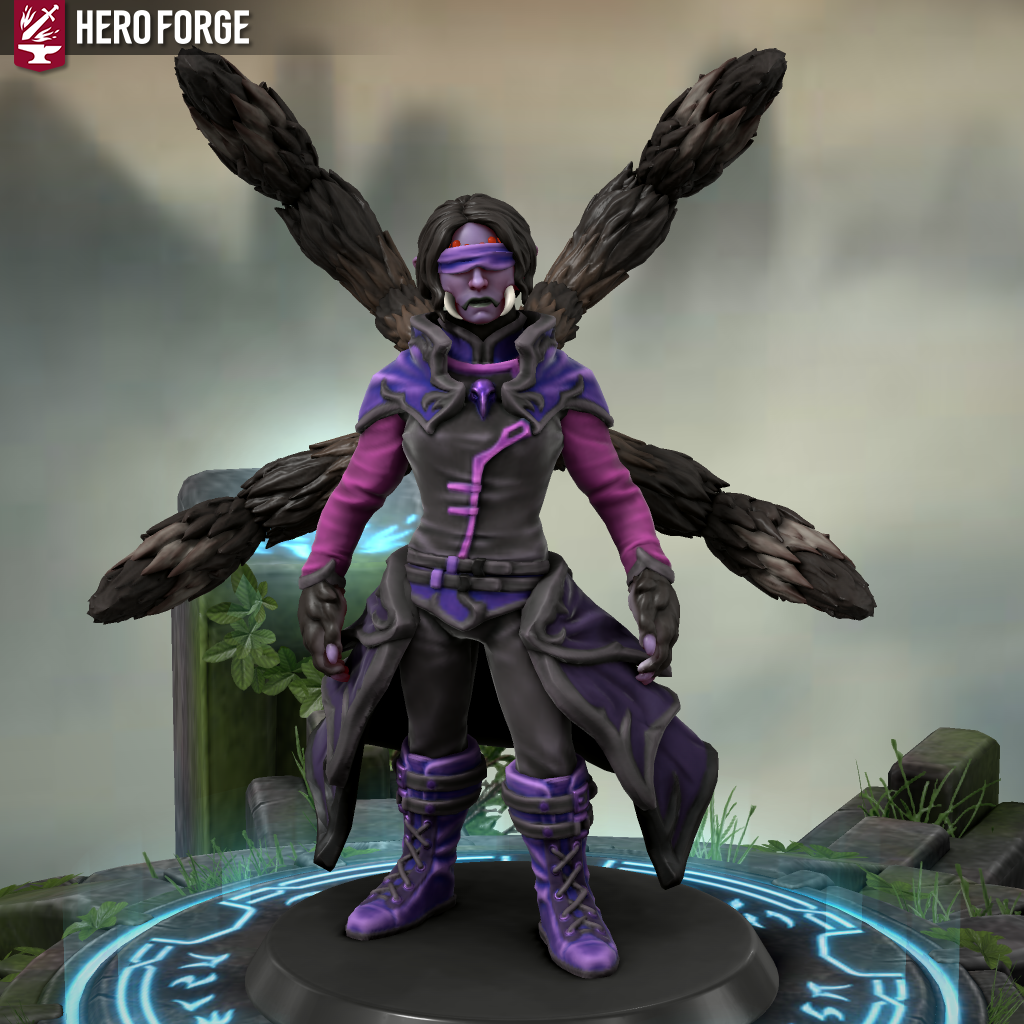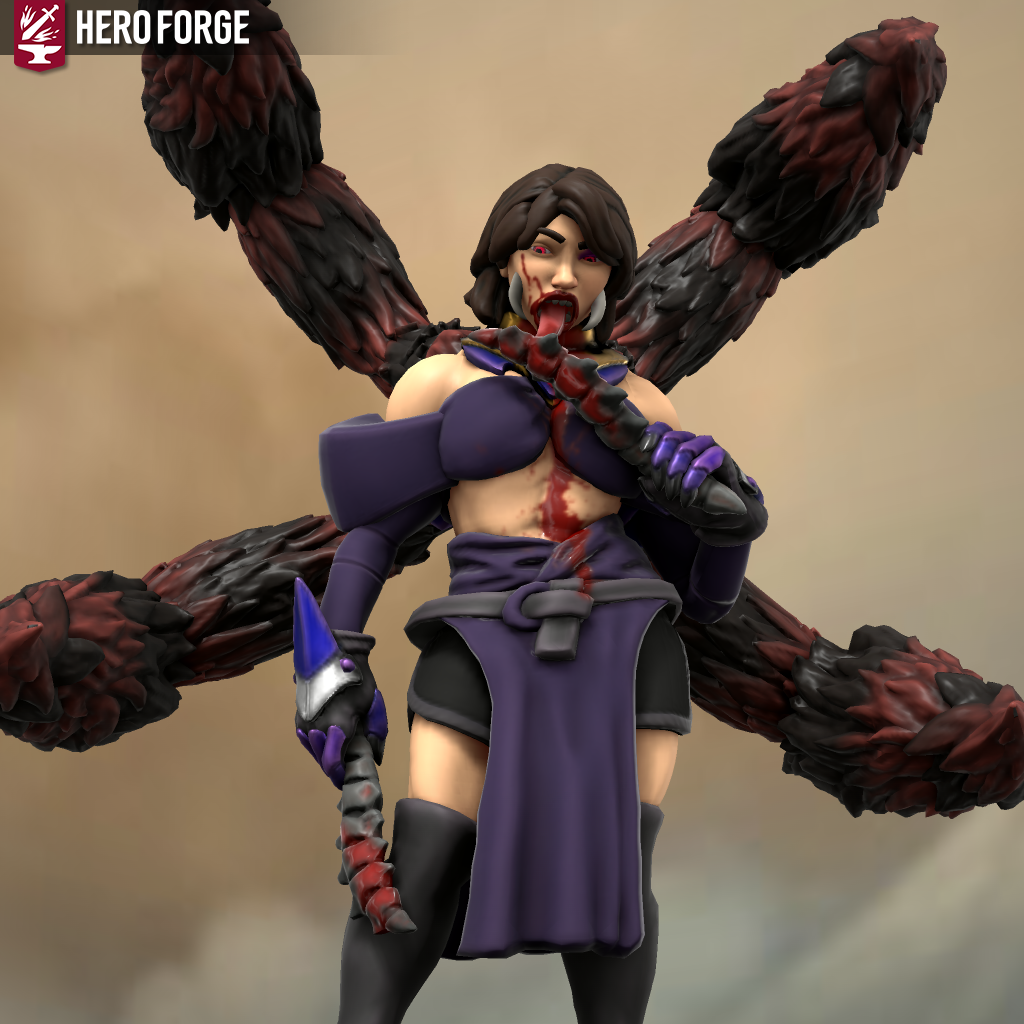Chitine
The innate fear of spiders most of us have, it does not come from the regular ones, or the big ones. It comes from them. Also, the ones that can walk on water. They scare the hell out of me!- Jutsu, the Purple
Description
The Chitine are a race of former servants for Drow societies, who have broken off from their previous lives as failed experiments and puppets for their superiors. They have, most commonly, dark shades of blue and purple as their skin. Their eyes often glow to help aid them in darker environments, offering others a glimpse into darkness, to find multiple pairs of eyes watching them from one point. Small, retractable claws lace their palms, so that they can scale walls with relative ease. As a predatory species, they also have mandibles, that can be laced with venom artificially, or through magical arts. Sometimes, the Chitine can also have four arms, or an extra set of four legs sprouted from their backs, which allow for easier traversal. Physically, there are many different types of Chitines, all for different purposes. Some can even take on a more humanoid form, but this is only for the more respected members of societies, including Broodmothers, and Arukans.The Chitine, when in a mono-species society, often rely on a matriarchal system of power, with very few Broodmothers dictating the orders of business for those beneath them. As the Chitine have many different forms of service, they each come in handy for many different reasons. When in more aquatic regions, Mariner Chitine are more common, with the ability to breathe through water. This does take a while, maybe even multiple generations for these changes to occur. When in intermixed societies, which is true for around a third of Chitine, they develop the same characteristics as their parents, except for Broodmothers. To become a Broodmother, it often involves a ritual, for a short-term investment of time, or shifting one's own body to become one. In society, the Chitine have developed an extreme sense of patience. Their webs are made with intricacy and aesthetic in mind, often homes being covered with sentimental items from one's life.
They stick to underground areas, mostly. These areas are easy to keep hidden, as their dark settlements are easy to be spotted. With webs hanging around them, sometimes even holding buildings up past chasms. They're also quite defensive of their homes. Miners, Lumberjacks, and any disruptive adventurer or explorers, are all advised to not go near their exclusive settlements, by both veterans of their respective businesses, and the Chitine themselves, with many signs all over their outskirts. With their extreme patience, they keep their local areas in perfect condition, growing alongside them. Those that are found to be desecrating their land, is met with a gruesome, unfortunate end, as food for the Broodmother, who is often found within a lair of webs, coiling around most likely a pit, or some other form of deadly, environmental hazard.
Naming a Chitine
When born in a sole civilisation of Chitine, the young are nameless until they have both reached maturity, and accomplished a minor goal in support of the collective. The civilisation offers names to the new member of their social circle, but it is ultimately their decision. Some of the names commonly offered by Chitine include;Male: K'etz, Kmar, Mul'cak, Ne'velk, O'goth, Varis, Yahnto
Female: Aa'tar, Fe'Wah, Skithrix, Strio'ia, Tey'sin, Uldrex
The names mostly chosen by Chitine by themselves resemble names given to most other creatures, commonly human and elven names.
Chitine Traits
Age. Chitine are fully capable of survival within one year. They start hunting in group at 6 months of age, hunt independently at the young age of 1 year old, and mature over the course of 7 years when they are finally considered adults. Chitine males and the females who do not become Broodmothers generally live to ages of 100 and onwards. Broodmothers can live for more than 300 years.Alignment. Chitine are generally neutral, as they live a simple life, but their alignment fluctuates depending on locals, and those around them.
Size. Chitine are often found between 3 feet and 5 feet. Broodmothers grow to be around 6 to 9 feet. Your size is small.
Speed. Your base walking speed is 25 feet.
Arachnid Sight. You can see in dim light within 30 feet of you as if it were bright light, and in darkness as if it were dim light. You can't discern colour in darkness, only shades of grey. You can pinpoint exactly where creatures are if both of you are touching the same web.
Fangs. Your teeth and mandibles are natural weapons. On a hit with an unarmed strike, you deal 1d6 piercing damage.
Spider Climb. You are able to scale walls with relative ease, as well as ceilings.
Exoskeleton. Your close anatomy to insects gives you a sturdy sense of protection. When unarmoured, you gain an AC of 11 + your DEX Modifier.
Subraces. You may pick from four subraces for the Chitine; Weavers, Hunters, Skitterers, and Broodmothers.
Weavers
Ability Score Increase. Your Dexterity score increases by 2 and your Constitution increases by 1.Developed Spinnerets. The most common form a Chitine can have, the weaver subrace is particularly adept at crafting webbing. As an action, you can produce up to 15 feet of rope-like webs, which have an AC of 10 and 4 HP. On contact with anything that isn't you, it sticks until broken or removed. You can produce an amount of this webbing equal to your Constitution modifier × 10, regaining all use after finishing a long rest. At 3rd level, you can expend 15 feet of this webbing to cast the web spell, using Constitution as your spellcasting modifier.
Adept Crafters. Thanks to their already genetically established role in society, most weavers adopt other trades. You have proficiency in one artisan's tool of your choice.
Hunters
Ability Score Increase. Your Dexterity score increases by 2 and your Wisdom increases by 1. Predatorial Hunt. You can designate any creature you can see, hear or smell as your prey. For the next hour, you have advantage on Wisdom (Survival) checks to track their movements.First Strike. When hitting a surprised creature, you deal an extra 1d12 damage.
Natural Jumper. When jumping, you can use your Dexterity modifier instead of Strength.
Skitterer
Ability Score Increase. Your Constitution, Dexterity and Strength scores increases by 1.Water Strider. Being from a special breed of Spiderfolk, you can skid across lakes and rivers like nothing. You can walk over water, not falling in unless you choose to do so.
Water Breathing. You can breath air and water.
Broodmother
Ability Score Increase. Your Charisma, Intelligence and Wisdom scores increases by 1. Size. A broodmother is significantly larger than most Chitine, and much heavier. Your size is Medium.Heavier Frame. Being much larger than your other kin leads to some downsides. Your climbing speed granted by the Spider Climb trait is halved.
Matriarch. Being naturally made for it, broodmothers are much more convincing. You have proficiency in one Charisma based skill of your choice.
Lord of the Deep. You may cast Darkness, at second level, once per day, at will.






Comments